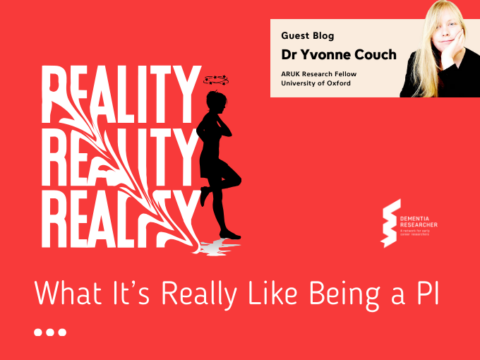When asked to introduce myself to other researchers, I occasionally describe myself as an interventionist. Usually as a speech and language therapist doing research and sometimes as a mixed methods researcher with a preference for qualitative. When I talk about interventions however, this is probably where I feel most comfortable. It’s the intersection between my clinical and research life. I have been delivering interventions for close to 20 years now and developing them as a researcher for 7 years. What I know now, is that it isn’t only about selecting the intervention for the person’s dementia diagnosis, it is about much more than that.
Too often I am asked by neurologists or fellow researchers “what intervention would you suggest for a person with this type of dementia”.
My response is usually tempered with a prefacing statement such as “It really depends on the person.” I might follow this with a comment on the current research evidence “This research evidence tells us x, y and z but…”. And the but is usually the most important bit. How can we decide on an intervention without understanding more about the how far the person has come on their journey, are they at the start, the middle or more towards the end? How has their dementia diagnosis affected them- do they have more or less typical symptoms and do they have any other long-term conditions? What is their current situation- do they have a job, a partner, a family or are they living in a nursing facility or on their own? And perhaps most importantly of all- what do they want to do? All of these things will have a significant impact on how we select, deliver and apply an intervention.
In an ideal world if someone had a diagnosis of dementia, we would open our box of interventions and select an intervention that we know works for everyone with dementia. This is of course also the best way of investing in interventions too. If we invest in an intervention that works for the majority of people with this diagnosis that’s an economically intelligent spend. We have spent money on something that is useful for most people. This is perhaps what might be described as taking a population-centred approach to healthcare. This works beautifully for many healthcare conditions, such as a broken leg or a chest infection. This doesn’t work quite so well for conditions that impact on cognitive skills and communication. These are far more complex.
When someone has a diagnosis of dementia they may experience difficulties using words. First of all we need to work out why this is. For people with some types of fronto-temporal dementia this may be associated with a breakdown of semantic information, for others they may develop an apraxia. Some people with Alzheimer’s disease may experience difficulties in word retrieval and phonological assembly. Additionally, at the start of the dementia journey the person may have more potential to improve or maintain these skills through practice, whilst a person who is more severely impaired may not have the cognitive capacity to achieve this.

Memory loss is usually the most common symptom of dementia but in some cases, patients lose their ability to speak first. Speech difficulty, known as aphasia, can range from simply forgetting a word to the complete loss of ability to speak.
Despite all of this we must remember there may be many other factors influencing a person’s communication. The bio-psychosocial model of dementia does a great job of reminding us that some of these may be fixed (or unchangeable) whilst others may be tractable (changeable). Some may be biological and others psychosocial. For instance, a person might have had a previous stroke, we cannot change this. Another person might be deaf, but a hearing aid might be used to modify this. A person may not have attended school, which we cannot change, but they may be low in mood, for which we may be able to prescribe antidepressants.
More specifically individuals may have very different priorities. One person may be determined to be able order their own meal in a restaurant, there wish to practice exercises to ensure they can do so verbally. Another person might find exercises too much of a commitment and wish to find an alternative way of doing this, for example using a communication aid to communicate their order and yet another may not consider this a priority at all, given their partner has always ordered for them. Importantly, partners, families and friends are important aspects of the individuals lives, and some may be skilled in supporting and enabling their loved ones, whilst others may unintentionally make things harder for their loved ones.
Interventions must take account of these individual differences to ensure the intervention works well for the person- we call this person-centred care. But person-centred care is hard to invest in. Person-centred care is not a one stop-shop. Person centred requires a skilled practitioner who can get to know a person deeply, and then jointly plan the best course of action or intervention for that person. And given people often change their minds, person-centred care means that we can change with them. Designing a different intervention for each person doesn’t necessarily seem like an economical method of delivering interventions, but on the other hand it means they are more likely to work (or be effective).
So, the bottom line is this- how can we convince investors to invest in interventions when we cannot guarantee there will be a positive outcome for everyone, when some people like one thing and others don’t. I probably wouldn’t invest in these interventions either. Perhaps we are selling this all wrong then. Perhaps the point is that we need to sell intervention development on a person-by-person basis? Perhaps we need fewer cohort studies and more case studies? Perhaps we need to let the investors know that this and help them understand how we think they should spend their money, on an intervention-by-intervention basis.
Author
Dr Anna Volkmer is a Speech and Language Therapist and researcher in Language and Cognition, Department of Psychology and Language Sciences, University College London. Anna is researching Speech and language therapy interventions in language led dementia and was once voted scariest speech and language therapist (even her children agree).

 Print This Post
Print This Post




